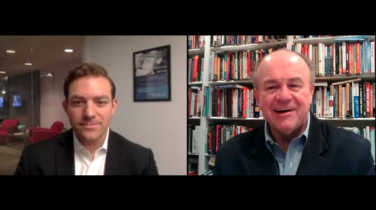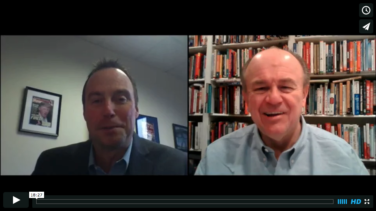PM360 Theodore Search from PM360 Online on Vimeo.
Physicians may be less inclined to let sales reps past their office door, but there is a place where engaged and receptive physicians are eager to receive more information from pharma marketers—online social communities. Dr. Theodore F. Search, PharmD, CEO and Founder of Skipta, explains how marketers can transcend brand promotion to provide true value to physicians by helping them enhance their practice and achieve better patient outcomes. And not only that, but how to create the right engagement between marketers and physicians—not just plopping more information in front of physicians in the hopes of getting views. Contact Theodore at tsearch@skipta.com to learn more.
Transcript
Bud Bilanich: Bud Bilanich back with another Expert on Call interview for PM360, and today we have quite an expert for you, his name is Ted Search. He’s a guy close to my heart, as I grew up in Pittsburgh, and he’s a University of Pittsburgh alum, and he runs a company called Skipta. So welcome, Ted. And why don’t you tell me a little bit about how you came up with Skipta as a name?
Ted Search: Well, thank you so much for your time. It’s greatly a pleasure to be here. Skipta—Skipta is an Icelandic word that means “exchange,” and what you’ll find as we go through the discussion today, the meaning behind it is we are a community exchange for verified medical professionals.
Now, I can’t take full credit for it. My beautiful wife came up with the name, and it was a perfect name for the company that I started quite a few years ago and really have had the privilege of seeing be successful today.
Bud Bilanich: Well, you know it’s always smart to involve your wife in these kind of decisions. I’ve learned that—gotten a lot of good insight from my wife, so you’re a smart man just making that choice.
Ted Search: Absolutely. Thank you.
Bud Bilanich: Yeah. All right. So tell me a little bit about what you guys do.
Ted Search: So Skipta, so we are a verified social network for verified medical professionals that is broken down into different communities, segmented by either a profession, specialty, or by disease state. So, Bud, what the heck does that mean?
Bud Bilanich: Exactly. And why is verified so important?
Ted Search: Absolutely. So to give you really a full explanation of what we are, let me just take you back for a few moments to 2009. My background, I am a verified clinical pharmacist by background. 2009, it was a Saturday morning. I was on call, and I was working on a chemotherapy product for a patient that was being discharged from a large hospital system.
The dose came into me, and during that Saturday morning, I had a few decisions to make. Number one, how was I going to get this medication paid for? How was I going to dose this appropriately for the patient that I had that Saturday morning? And also, how was I going to set this up in a way that my patient would be adherent to the medication?
So sitting back that morning, being on call, working with the oncologist that I was working with at the health system that was discharging this patient to my care, I can honestly tell you it was very challenging. As a young professional, I believe I’m pretty smart and very well educated in what I do. I had a couple questions that I couldn’t answer.
And I thought to myself, “Why can’t I call a verified specialist like myself or connect to them to collaborate on these questions that I had? Number two, why is there not one place that I could go that I could pull this formulary information, the reimbursement information?”
And from that simple idea, I thought to myself, “Social media is a great tool. What if I created, out of my problem, a solution?” And from that, Skipta was born. It was initially designed to be a verified social community to enhance the way pharmacists, like myself, could communicate and collaborate.
We were very successful in allowing pharmacists to utilize this community to enhance the way they practice, get questions answered like I had on that Saturday morning, enhance their patient outcomes. We, then, stepped back and said, “If we could do this for a bunch of pharmacists, maybe our colleagues that are oncologists, neurologists, urologists, maybe they have the same need.” And very quickly, we found out they did.
And going back to what I initially told you, that’s really what Skipta is. It’s the creation of a way that will enhance the way medical specialists can communicate and collaborate with each other, and it just so happens we found the best way to do it is by creating verified social networks broken down by their profession to really drive this collaboration.
Bud Bilanich: That’s really cool because it’s all about community, and I know you’re right. As you go to talk to your story, it probably was a bit of a problem that it was on Saturday. But had it been on a Monday or a Tuesday, it probably would’ve been almost as big a problem in terms of being able to interact with somebody. So I take it with Skipta, your members can interact with other members and get a lot of real-time answers to some of their questions. Is that one of the real benefits of what you’re offering?
Ted Search: Absolutely. Yes. Many social networks that are out there, even verified medical networks, are all about driving the connection, which, don’t get me wrong, is very, very important. But when we stepped back and looked at my need, it was also about driving that collaboration. And what would’ve helped me that Saturday was another verified clinical pharmacist like myself.
So taking that model, what we did to really drive that collaboration is segment our communities by a profession, by specialty. So for instance, our urology community, it’s only for verified urologists. So when they go in there, they can access very targeted information that they would need as a urologist. They are able to reach out and get opinions and information that can help improve the way they practice from other urologists, not just another healthcare professional. So being broken down by specialties, being very specific on who the like-minded, verified medical professional are within the community really enhances not only the connection but also the collaboration that allows medical professionals like myself to advance the way that we practice and ultimately advance our patient outcomes.
Bud Bilanich: Yeah, better outcomes for patients. It’s interesting. My wife had just been in the hospital. She was coughing and coughing and coughing. We finally went to the doctor. When they did chest X-ray, she had pneumonia in both her lungs.
And apparently it was a severe enough because when she first was in the hospital on 11 liters of oxygen, and I’m sure the pulmonologist probably would want to consult with other pulmonologists to say, “Hey, look. We got a person here who is never on oxygen, but is so sick now she’s at this high dosage. What do you recommend?”
Ted Search: Absolutely. And we found that is a huge need, and that was one of the reasons that our platform is not only just accessible via computer, but we’re in their hands at the point of care via mobile devices. So we have a very unique way that that pulmonologist in that case could pull out that their app for Skipta’s pulmonologist connect, could actually bring in an X-ray, de-identify the patient identifier, and get it out to a verified group of pulmonologists that really could allow that pulmonologist to make a more informed decision. Because as we know, physicians, they see their colleagues as their number one trusted resources. So all we do is just—we bridge the way that they can communicate more effectively.
Bud Bilanich: Yeah. I mean and in my wife’s case, this was interesting because it was truly an anomaly. I mean they generally don’t see people that sick that quickly, and so I can see where a physician would really want to consult with a trusted colleague.
Ted Search: Absolutely. Absolutely.
Bud Bilanich: All right. So it’s really cool what you’re doing.
Ted Search: Thank you.
Bud Bilanich: And I talk about, again, PM360 is really a publication for pharma brand managers. So if I’m a pharma brand manager, what’s my advantage in somehow tying into Skipta or working with you? Or how can I better reach docs basically using your platform or something similar? I’m sure yours is the best. But what’s the advantage to me as a brand manager?
Ted Search: No, it’s a great question, and I talk to brand managers about this all the time. The most exciting thing for a brand manager in this area is that the content or even the promotion, they want to reach us medical professionals with is something that we need. It’s something that goes along the lines of everything I just talked about. By getting more access to their product information, their safety and tolerability information, their reimbursement information, that also allows me, as a medical professional to make more informed decisions and ultimately lead to better patient outcomes.
So the reason I say that is because we’re broken down by specialties, we really—“we” meaning Skipta—have learned from our different specialty audiences—over 30 now, ranging, again, from oncologist, a pharmacist, nurse practitioners, neurologists. We’ve learned from them, “Okay, what type of information do you want from the brand managers? What can they deliver into your community that will be very beneficial to you to lead to better patient outcomes?”
And the fact that we’re broken down by specialty, brand managers can get very specific on the content that they can deliver through our communities. It can be through ads. It can be through alert messages. It could be through content or branded websites that they want to bring into our community.
But for instance, what I as a pharmacist need from a brand manager is probably adherence information, different content that will allow me to practice better as a pharmacist. But that is very different, potentially, than, let’s say, a urologist or oncologist might need from a brand manager.
So the advantage of Skipta being broken down by specialties is the content that brand managers can reach our specialists with can be even more specific because they can reach them with the correct information. Because we are developed in a way that we’re within a verified social community, they can reach them, now, not only with the right information but in a place in which they are very engaged, in a place where they can get that content, get direct feedback on that content from their number one trusted resource, their peer, and in a way that they can take the information and not only see an ad flash up in front of them but see that ad as a callout to them directly. They can get that information and then, of course, really engage with that information and utilize it to improve the way that they practice.
And for a brand manager, what they can understand by working with us is it’s a targeted message. They can reach a verified professional within our community, and it’s not really reached, but they’re developing a very engaged receptive target that will engage and interact with their content.
Bud Bilanich: Yeah, you just used target, I mean it sounds to me that one of the big advantages for a brand manager here is that using a highly segmented service like this means that they are really—it really helps their targeting. They’re dealing specifically with the audience that they want to reach with a specific product that they’re trying to promote.
Ted Search: Absolutely. It helps with targeting. It helps with engagement because now they can target the right specialist and get the right content that the specialists want and will engage with. And ultimately, that’s what leads to success because the last thing that a brand manager wants to do is just pop information in front of specialists to get views. We’re totally against that as well.
We’re saying, “Let’s get the right engagements for you. Let’s learn what information will reach the right target in a way that they won’t see your information and just view it for a couple seconds, but they can take that information and really use it to advance the way that they practice.” Because when we can do that, we win for our specialists. We allow them to practice medicine more effectively.
And also for our brand managers, we win for them because we’re delivering their content and information in a way that really drives value to the specialists that they’re trying to reach. So we transcend promotion into engagement, into value.
Bud Bilanich: Well, speaking of engagement, can your brand managers participate in these communities? Or are they just limited to the medical professionals?
Ted Search: They can in certain ways. Now, one thing we always tell brand managers is you can use an innovative tool like ours. But at the same point, we are very cognizant of the regulatory regulations that they have to comply with. So what I mean by that is, predominantly, a lot of our promotional messages is hands-off for the brand managers in a way that we will take their assets and content and bring it to our medical professionals without exposing them to the risk of any conversations or information they should not be exposed to as regards to regulatory.
Now, if they want to get insights, we also do that in an innovative yet regulatory, compliant way. We can do it through pulse surveys. We have a very innovative virtual advisory board tool that allows them to post questions and information to top KOLs or top specialists to get feedback on.
So what we do—we allow them to engage with the audience, but we are very familiar with what they can and cannot do. And that’s a big advantage that brands have been working with us is that we can allow them to leverage the power of social in a way that they are allowed to and in a way that will deliver the right results for them but in a way that will be compliant with their regulatory.
Bud Bilanich: Well, you’re really right there on the cutting edge because I know that in pharma, social is something that people talk about a lot. And a lot of times, what I hear is, “Yeah, it sounds like a great idea, but I’m not quite sure how I could use it because I’m sort of so tied up by some of the regulations.” And so it sounds like you’re allowing them to be compliant and still take advantage of social. Is that a gross oversimplification?
Ted Search: No. Absolutely. We work with a number of brands and companies we’re privileged to work with. And one thing we’re very excited to say is we can allow them to be innovative, but we are very familiar, as medical specialists ourselves, as former brand leaders ourselves that are on our team, what they are and are not allowed to do. So we really become that solution for them to leverage social responsibly yet innovatively and yet in a way that will drive the necessary outcomes that they’re looking to achieve.
And also, in a way that will transcend, again, just reach into engagement with a target. And that doesn’t necessarily mean tearing down the barriers of allowing them to free form communicate together. What I mean by that is again taking their information in a way that really will engage this target in a way that their target, their medical professional, looks to them to further contribute.
Bud Bilanich: This has been a tremendously interesting conversation for me. Unfortunately, we have to wrap it up. Any last thoughts that you have about this, particularly how social can be of a benefit to a brand manager?
Ted Search: I do. Just the last thing to say is we all are very familiar with social. We know why it’s revolutionized the way that we communicate. And when brands can leverage this power in a way that transcends their message, again, from just promotion into contribution, that’s when both the target, the medical professional can win, and the brand can win.
And what I can tell you about Skipta was we created this out a need. I shared with you what that need was, and the importance behind that is when companies work with us, they’re reaching, again, this target—medical professional—in a way that they want to be reached, in a way that they’re receiving the right communication.
And when that happens, you have a very engaged medical professional. That’s enhancing the way they practice, enhancing their patient outcomes. And ultimately, the brand’s pretty excited because they’re contributing now instead of just promoting to this medical professional and to the professions.
Bud Bilanich: That’s great. All right, folks, I’ve been talking to Dr. Ted Search here from Skipta, the CEO and Founder, and actually, you might even say creator. He came up with the idea and built it into something, which is pretty impressive in and of itself. If you’re interested in what he’s having to say, you should read some of his articles, the Expert on Call articles on PM360. And, Ted, I can’t thank you so much for taking the time to chat with me today.
Ted Search: Bud, it was my pleasure. Thank you so much for your time.
Bud Bilanich: All right. Thanks a lot.







